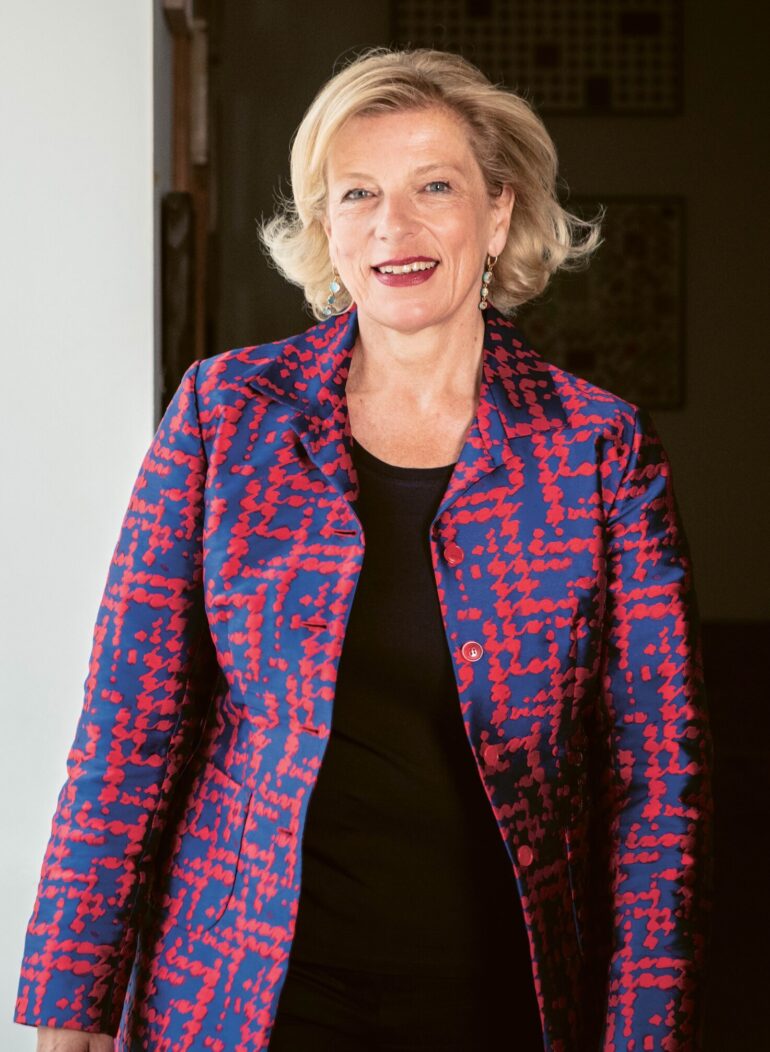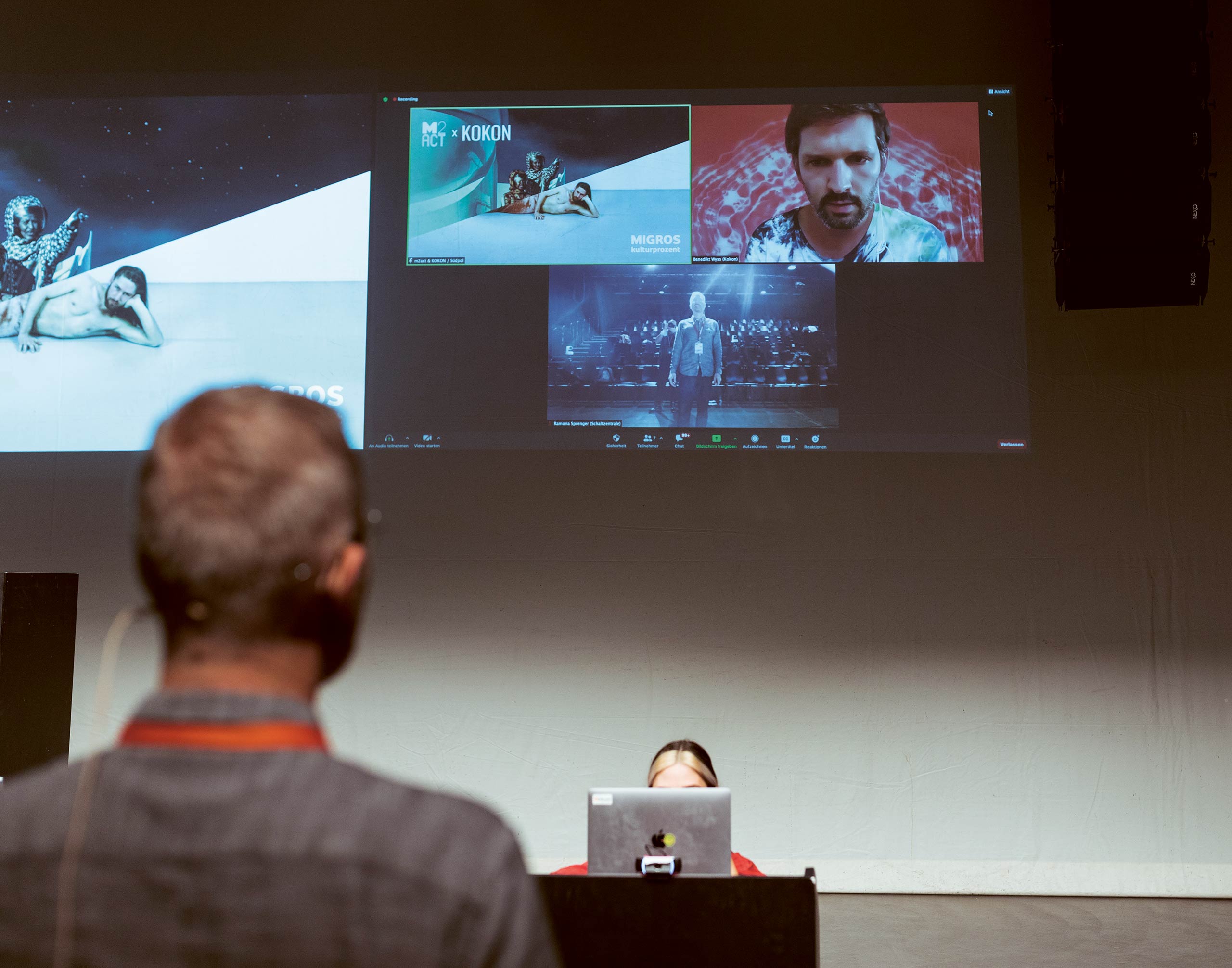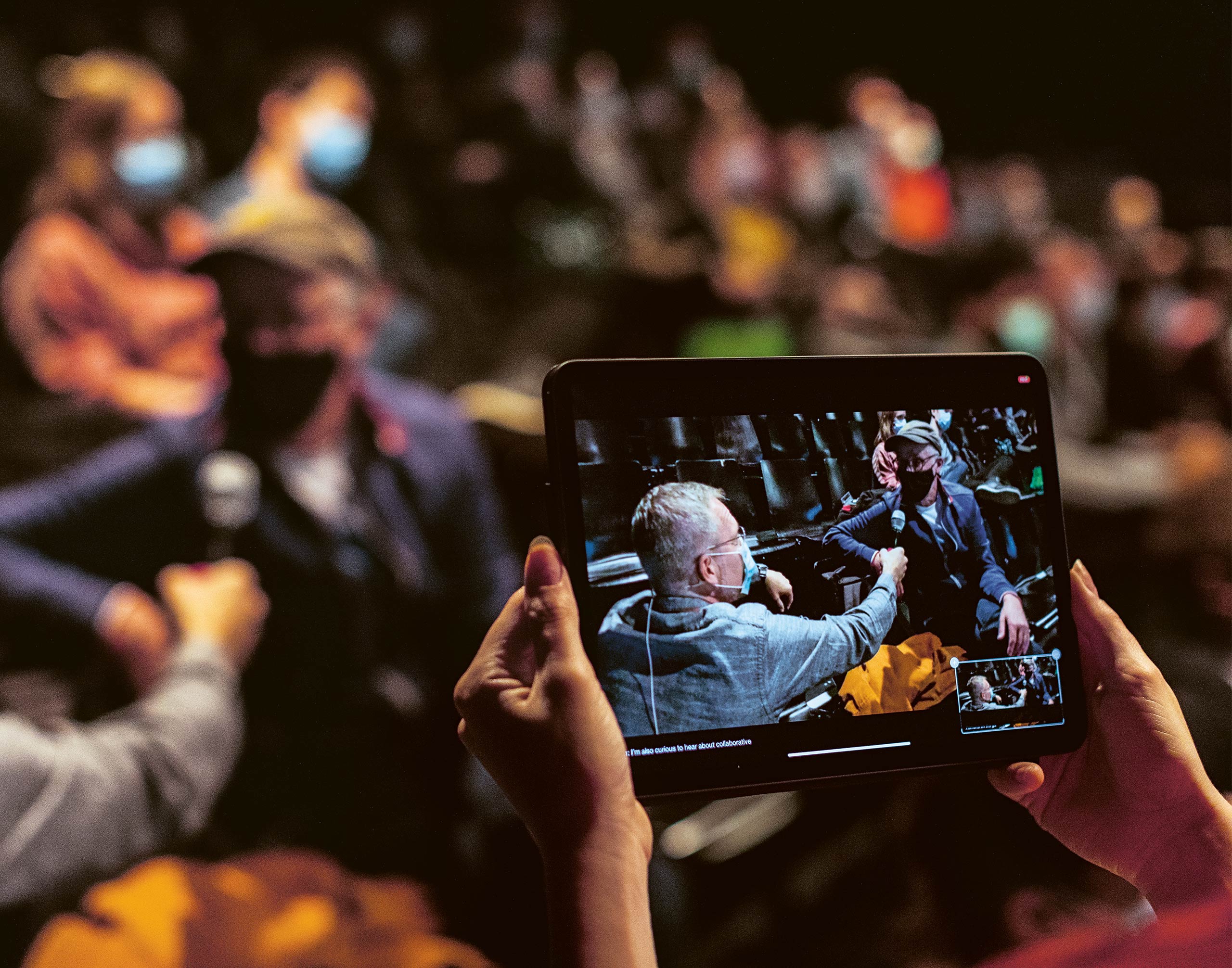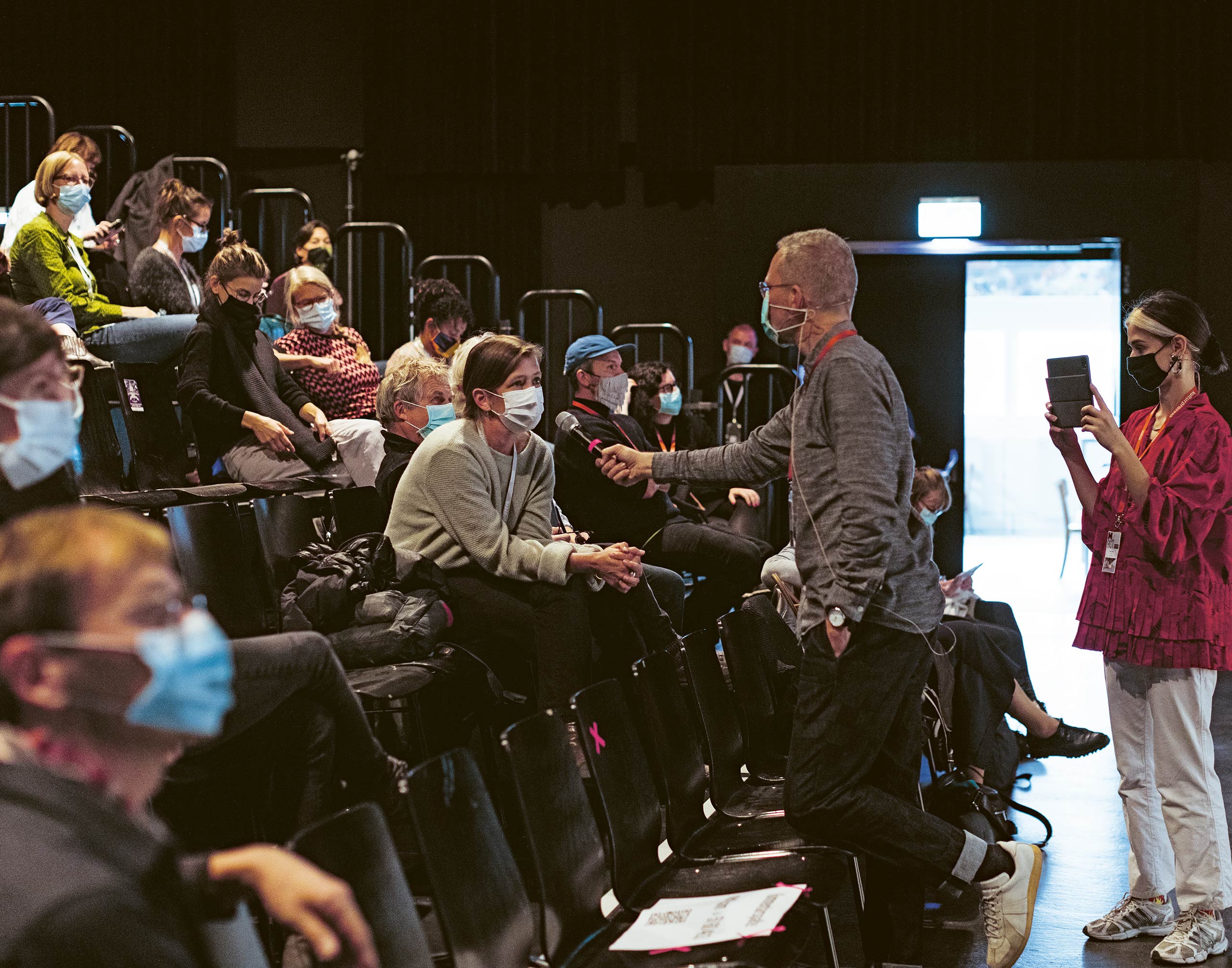As Head of the Culture and Social Office at the Federation of Migros Cooperatives, Hedy Graber is an expert in the Swiss cultural scene and a powerful force in promoting Swiss culture. The coronavirus crisis has put the organisation’s newly developed funding strategy to the test.
Two years ago, you revised the funding strategy in the field of culture. How has the new strategy fared in the face of coronavirus?
In this extremely challenging period, the fact that we had planned to review our application process in April 2020 was advantageous. Since then, we have organised it in terms of ideation and dissemination.
Meaning?
We looked at production budgets and realised that very little money was going towards the development phase of projects – the ideation. And in many cases, it is clear that if more resources had been invested in the research phase – experimenting and trying things out – the whole production would have been established in a more sustainable way. Which is why we have put more emphasis on ideation.
Did that work during lockdown?
Yes. People couldn’t go out, so creative artists had the time to develop ideas. And we supported them in their research.
And dissemination?
That’s our second funding area. It’s very much in the Migros spirit – we essentially want to serve culture up to people like a food truck. Many productions take place at a very local level, however. Funding often takes people up to the first performance, but they aren’t able to then go on tour. Artists need to be able to perform to gain experience. And audiences need to be able to discover new things. This shouldn’t be limited to specific regions, it should be taking place in multiple locations.
And how did that work during lockdown?
Extremely well. We’re interested in new, innovative approaches. We’re not just looking to fund yet another museum tour. During lockdown, lots of projects went online. And we were ready to help support these new distribution channels. We were able to cater to many of the new demands of creative artists.

Profile
Hedy Graber has been Head of the Culture and Social Office at the Federation of Migros Cooperatives in Zurich since 2004. She is responsible for the national focus of the cultural and social projects run by Migros Cultural Percentage. She was also in charge of establishing and advancing the Engagement Migros development fund, which was founded in 2012. In addition, she is president of the Culture and Economy Forum (Forum Kultur und Ökonomie) association. Graber is a member of the Lucerne university council, various committees, juries, boards of trustees and administrative boards. She was named European Cultural Manager of the Year in 2015.
Migros Cultural Percentage also organises events itself. How have you dealt with your own events during the pandemic?
Our m4music pop festival was planned for March, for example. We expected 6,000 people to attend. We went into lockdown a week before the festival was due to start. We immediately shifted to an online format. We were probably the first people to organise a coronavirus panel for artists. Of course, the technology wasn’t quite there yet. Nevertheless, we managed to gather together the key figures from the pop scene.
What was your relationship like with the artists during this period?
We underestimated the impact of people not being able to meet up. We thought that word would automatically spread about the support we were offering in the area of dissemination. We had to increase the consulting and support we were offering. From my perspective, it brought us closer together.
Artists are facing huge financial challenges. At the same time, crises always offer a huge amount of creative potential. How do you feel artists have responded to the crisis?
I always say that in the cultural sphere, you learn to ask lots of questions without necessarily expecting an answer right away. In this field, you need to be able to deal with uncertainty. However, the question remains as to why artists don’t have a stronger lobby, and why ski resorts have stayed open but museums haven’t. The catastrophic impact of the crisis on the cultural sector is yet to be properly felt. Not every artist is in a position to give a concert for 1,000 Instagram followers. The challenges are complex. Finding the right answers will be a gradual process. Which is why we are trying to take concrete steps at this stage. For example, we have just launched a classical project for a small audience, planned for March. But we are already prepared to reschedule if we have to, and the funds will still be paid out even if the event doesn’t take place in the end. That kind of reliability makes all the difference.
What originally caused you to rethink your funding strategy?
In 2012, we developed and launched the Engagement Migros development fund. And after having reworked the strategy in the social sector, reviewing the strategy in the cultural sector was the logical next step. Our function is twofold. We want to act as a driver, stimulating the sector with our own projects and tenders. We also want to act as an enabler, facilitating projects that are brought to our attention. With the new strategy, we no longer offer funding by individual discipline – such as music, theatre or dance – but at an interdisciplinary level. We see our support in the areas of ideation and dissemination as a complement to government programmes. It helps maintain the level of background activity.
You have done away with funding for individual disciplines. Has this system worked?
We haven’t done away with it. We have adapted our internal organisational structure. We have maintained the same level of expertise in the individual disciplines. When it comes to funding social projects, we don’t differentiate based on areas like healthcare or volunteering. In the cultural sector, we intended the new strategy to encourage dialogue. Our head of film recently presented a new funding format, the Story Lab, at the Solothurn Film Festival. She was inspired by her colleague working on the m4music music programme, for example.
As part of Migros, your funding activities are very public. How does this impact your work?
Artists seek support first and foremost from government programmes. After that, Migros is the next choice. Which I think is great. It means we’re a kind of essential service provider. Of course, there is no entitlement to funding. But we are very firmly established, including with our regional cooperatives. Whether Migros Culture Percentage encourages people to shop at Migros I don’t know. Of course, that would be great. But we’re not a marketing tool. Unlike us, charities are able to work much more discretely. However, over the past 20 years, I have seen the sector become much more professional, thanks in part to SwissFoundations. There are really brilliant initiatives emerging. And there is more transparency.
How much difference does it make that you are part of a private company?
Our activities are dependent on company turnover. That’s an interesting difference compared with charities – Migros always makes money. Plus, thanks to ongoing planning, we are always sufficiently prepared to be able to react to changes.
m2act – a funding and networking project for performing arts by Migros Cultural Percentage – was launched in a hybrid format at Südpol in Lucerne in 2020.
How do you evaluate the success of your funding strategy?
We don’t just want to do the things that appeal to us. If people don’t appreciate what we do, then we’ve done a bad job. In economic terms, that means if there’s no interest in the market, our work is meaningless.
Is your market the audience or the artists?
Both, definitely. We’re not carrying out projects from our ivory tour and waving down to see if anyone is interested. Our projects are very participatory. We launched the performing arts programme m2act in 2020, for example. The result is not a finished project but a method for facilitating collaborations and connections. Artists shouldn’t stay in their own isolated worlds. Of course, there are concrete facts and figures for measuring success. But quantitative measurements are only one side of the story. A full concert hall is all well and good, but the quality of the music is equally important.
Women are often underrepresented in the cultural and creative sectors, too. Does gender play a role in your funding work?
It’s a topic in our sector too, of course. But we don’t have an politically correct composition. For example, we don’t have a female team member from Ticino to represent that region – but it’s a topic that’s on our radar. We held an exhibition on cyberfeminism at the Migros Museum two years ago, for example. There are a lot of women represented in our collection, too. That’s something that matters to us.
Where do you see potential for growth in this area?
I’m very pragmatic. I have the opportunity to promote the topic in my role. In every committee I’m on, I always ask where the women are. We need to start thinking more diversely. That includes questions around new modes of living. What do I need to do to make sure that people with different ways of living can do their job well? This goes beyond the classic topic of balancing work and family life. We need to see these different models reflected in the world of work. At a political level, it’s important to me that women occupy a more prominent position. We supported the Helvetiarockt platform, which promotes women in the music industry. My guiding principle is that women need to become more visible. Platforms like this can help, from supporting female technicians to female bassists. But we still have a long way to go.
‘We need to start thinking more diversely. That includes questions around new modes of living.’
Hedy Graber
When you look at the average classical orchestra, you can immediately see that women are not equally represented.
When I look at the women instrumentalists who take part in our talent development programmes, there are clearly lots of extremely capable female musicians. But we shouldn’t just be looking at the orchestra. We need female conductors and soloists, too.
Your mother was the first female conductor in Switzerland. How did that influence you?
It influenced me in two ways. I learned to respect culture. My mother played the piano constantly – whether you wanted to listen or not. She dedicated her whole life to art. That made a huge impression on me as a child. My mother also achieved incredible things for her time. When she left Geneva to join the Conservatoire de Paris in 1949, they needed to change the eligibility requirements to allow a woman to even study conducting. That had a big impact on me. I learned that there was a profession some people were banned from entering.
What was the experience like for your mother?
She conducted a lot in Scandinavia, where the countries were a bit more progressive in that respect. In Switzerland, the idea of having a female conductor was unthinkable. My mother had to learn what it meant to be ahead of her time. She once received a rejection from a German orchestra that read: ‘Dear Mr Salquin, even though you are a woman, we are addressing you as “Mr”…’ They did not want a woman as a conductor.
Were you ever tempted to become a creative artist yourself?
I studied art history. I had always been interested in the way cultural contexts are expressed in images. I’m sure my mother’s historical context played a part in that, too. But no, I was never interested in becoming an artist.





